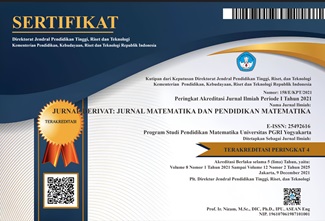Permainan Ular Tangga Sebagai Media Meningkatkan Kemampuan Berhitung Anak Sekolah Dasar
DOI:
https://doi.org/10.31316/jderivat.v10i2.6872Abstract
The ability to count is part of mathematics which can develop children's cognitive abilities. It is very important to develop the ability to count in children, because counting can be used in children's daily lives. The problem faced by children in their ability to count is that children lack skills in doing calculations. Lack of numeracy skills can cause low mathematics learning achievement. This research aims to examine the snakes and ladders game as a medium to help elementary school children improve their numeracy skills to solve math problems. The method used in this research is descriptive qualitative with data collection through observation, interviews and documentation. It was tested in three stages and involved nine children who had different numeracy abilities. The results of this research are that children become more skilled at doing calculations, learning becomes fun, learning activities become interactive, and motivation to learn to count increases. The snakes and ladders learning media can increase motivation to learn to count and solve math problems.
Keywords: Snakes and Ladders Game, Numeracy Skills, Media
References
Bodrova, E., & Leong, D. J. (2004). Chopsticks and counting chips: Do play and foundational skills need to compete for the teacher’s attention in a early childhood classroom? In D. Koralek, Ed., Spotlight on young children and play. Washington, DC: National Association for the Education of Young Children.
Britton, Lesley. (1992). Montessori Play and Learn: a Parent’s guide to Purposeful Play From two to Six. New York: Crown Publishing Group.
Clements, D. H., & Sarama, J. (2005). Math Play: How Young Children Approach Math. Early Childhood Today, 19(4), 50-57. California Preschool Instructional Network. (2010). Engaging Children in Early Mathematical Experiences. Sacramento, CA: Sacramento County Office of Education. Retrieved from https://cpin.us/sites/default/files/fcab_resources/fcab_res_math/fcab_mat_thprac/Engaging%20Children%20i n%20 Earl y%20Mathematical%20Experiences.pdf
Eliana, N. (2016). Peningkatan Hasil Belajar Matematika Materi Operasi Penjumlahan Bilangan Bulat Melalui Permainan Lompat Henti. Jurnal Pendidikan Dasar, 7(1), 90-99. https://doi.org/10.21009/JPD.071.08
Griffiths, Rose. (2010). The Excellent of Play, Second Edition :Mathematics and Play. British: Open University Press.
Hyvonen, P. T. (2011). Play in the School Context? The Perspectives of Finnish Teachers. Australian Journal of Teacher Education,36(8). http://dx.doi.org/10.14221/ajte.201 1v36n8.5
Margery D. Osborne and David J. Brady. (2001). Constructing a Space for Developing a Rich Understanding of Science through Play. Journal of Curriculum Studies 33: 511–24. Education and Advanced Learning. (2015). A Time for Learning, A Time for Joy: Resource for Kendergarten Teachers. Canada: Goverment of Manitoba. 22
National Council of Teachers of Mathematics (NCTM). (2000). Principle and Standards for School Mathematics. USA: The National Council of Teachers of Mathematics, Inc.
Nurkamilah, M., M Fahmi, N., & Aep, S. (2018). Mengembangkan Literasi Matematika Siswa Sekolah Dasar melalui Pembelajaran Matematika Realistik Indonesia. Jurnal Theorems (The Original Research of Mathematics), 2(2).
Putra, D. O. P., & Purnomo, Y. W. (2023). PENGARUH PENDEKATAN PENDIDIKAN MATEMATIKA REALISTIK INDONESIA (PMRI) TERHADAP KEMAMPUAN NUMERASI SISWA. AKSIOMA: Jurnal Program Studi Pendidikan Matematika, 12(1). https://doi.org/10.24127/ajpm.v12i1.6231
Wahyuni Ningsi, S., Kadir, K., & Rahmat, R. (2022). Pengaruh Pendekatan Pembelajaran Realistic Mathematics Education Terhadap Kemampuan Literasi Matematika Siswa SMP. Jurnal Amal Pendidikan, 3(1).https://doi.org/10.36709/japend.v3i1.25271
Widyastuti, N. S., & Pujiastuti, P. (2014). PENGARUH PENDIDIKAN MATEMATIKA REALISTIK INDONESIA (PMRI) TERHADAP PEMAHAMAN KONSEP DAN BERPIKIR LOGIS SISWA. Jurnal Prima Edukasia, 2(2). https://doi.org/10.21831/jpe.v2i2.2718
Sari, P. (2017). Pemahaman Konsep Matematika Siswa pada Materi Besar Sudut Melalui Pendekatan PMRI. Jurnal Gantang, 2(1). https://doi.org/10.31629/jg.v2i1.60
Yogman M, Garner A, Hutchinson J, et al; Aap Committee On Psychosocial Aspects Of Child And Family Health, Aap Council On Communications And Media. The Power of Play: A Pediatric Role in Enhancing Development in Young Children. Pediatrics. 2018;142(3):e20182058.
Downloads
Published
Issue
Section
Citation Check
License
Copyright (c) 2024 M.M. Endang Susetyawati, Bintang Wicaksono, Lisa Oktavia, Nadia Maharani Putri

This work is licensed under a Creative Commons Attribution-ShareAlike 4.0 International License.
Authors who publish with this journal agree to the following terms:
-
Authors retain copyright and grant the journal right of first publication with the work simultaneously licensed under a Creative Commons Attribution-ShareAlike 4.0 International License that allows others to share the work with an acknowledgment of the work's authorship and initial publication in this journal.
- Authors are able to enter into separate, additional contractual arrangements for the non-exclusive distribution of the journal's published version of the work (e.g., post it to an institutional repository or publish it in a book), with an acknowledgment of its initial publication in this journal.
- Authors are permitted and encouraged to post their work online (e.g., in institutional repositories or on their website) prior to and during the submission process, as it can lead to productive exchanges, as well as earlier and greater citation of published work (See The Effect of Open Access).







